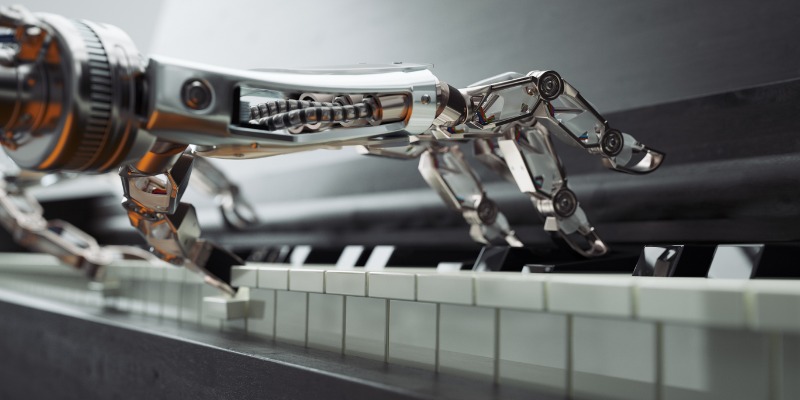What Music & AI combine
Artificial intelligence now knows no boundaries in the music industry. Here, too, the AI is a dominant factor and its role is becoming increasingly important. But what do the music professionals say? Does artificial intelligence have the power to replace composers etc.? Claudia Janet Birkholz, lecturer for piano and new music, also asks herself this question.
Claudia Janet Birkholz is a talented pianist and lecturer for piano and contemporary music at the Hochschule für Künste in Bremen. She spends her professional and private time with the latest developments in and around the music industry. The field of artificial intelligence (AI) in music plays a decisive role.
In 2015, the pianist founded the discussion concert series “Let´s talk music” in Bremen in order to explore and link current music themes. Live presentations also go hand in hand to make the series tangible. The participants consist of members and representatives from the fields of music psychology, science, neurology as well as artificial intelligence and can immerse themselves in animated conversations with the audience. Claudia Janet Birkholz is constantly expanding her interest in new developments in research and science and can look back on years of experience and research.
The intelligence of human & machine
Human intelligence influences many senses & physical parts. The own perception, the ability to make decisions as well as to carry out motor actions and to develop strategies. An AI, on the other hand, attempts to simulate human intelligence with computer programs or robots, for example, and to create an image.
These days there is nearly anyone who doesn’t know the term “AI” or “artificial intelligence” because it is almost ubiquitous and we encounter it in many daily situations, such as in a smartphone or in the smart assistant “Alexa”.
What almost all AI systems have in common are algorithms that analyze data to recognize patterns and learn rules to execute. Also the term “Machine Learning” often beguiles you… The currently most complex variant of this procedure is deep learning, where the search for common variables and laws is done to find a pattern.
KI conquers the music industry
Many professors at universities are already working intensively with their students on the topic of AI. The combination of Artificial Intelligence with Music & Composition is nothing unusual anymore. These connections have been researched for almost 30 years. AI systems in music can be based on different approaches, the best known of which is the recombination of patterns. Music Professor David Cope is considered to be one of the first to research AI in music, who also researched the recombination of patterns in the 70s and developed the resulting software “EMI – Experimental Musical Intelligence”. It can recognize and update musical patterns. It composes pieces of music that are similar to well-known pieces of music and can be traced back to their composers. Quasi a version 2.0 by Johann Sebastian Bach.
A software can be used as an assistant for live performances of composers. For example, there are still challenges to play extensive scores without being able to turn the sheet music because one is busy with both hands on the keys.
If the score text were digitized and a computer could recognize where the music is being played, the page break could happen at exactly the right moment. That would be extremely helpful.
However, a machine cannot completely replace a musician. In the field of creativity, for example. Claudia Janet Birkholz, however, can imagine that artificial intelligence provides a kind of pool of ideas from which the composer can then choose what seems inspiring enough to him to elaborate further.
A progress with melody.
This article is based on an article by PCWelt.de
Cover source: iStock.com / Menno van Dijk
[plista]


